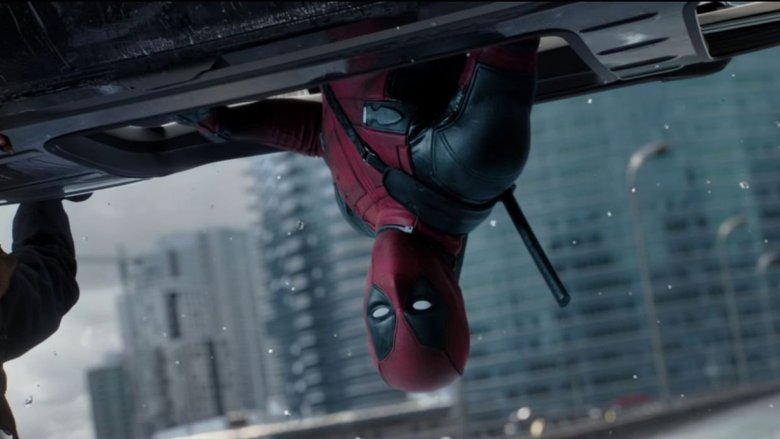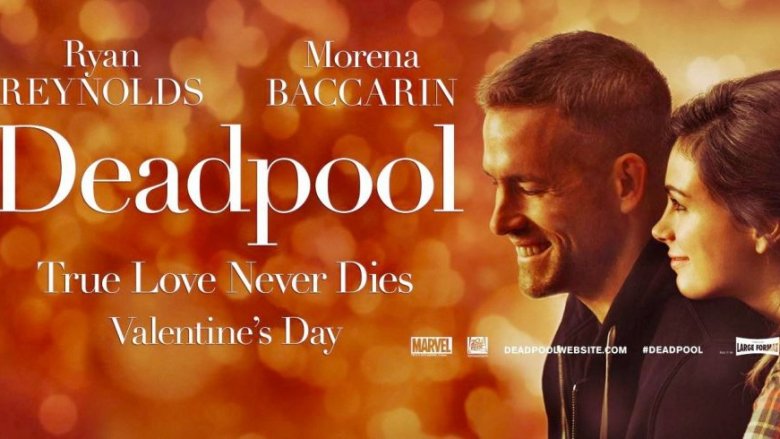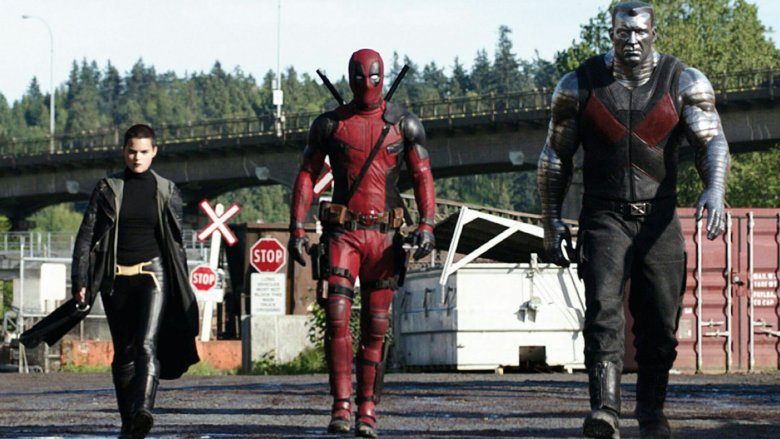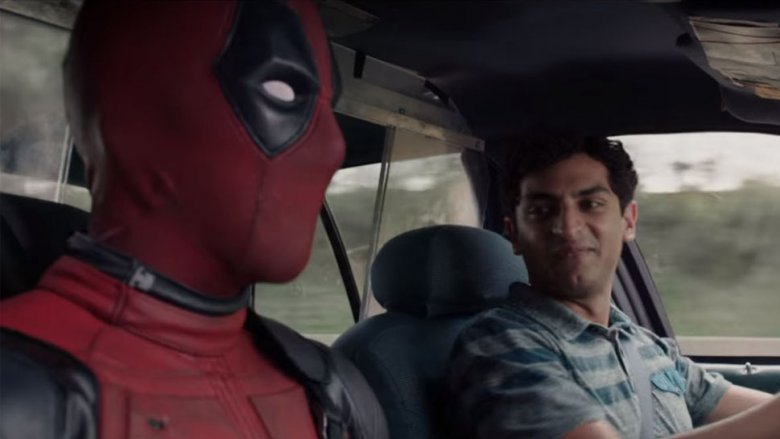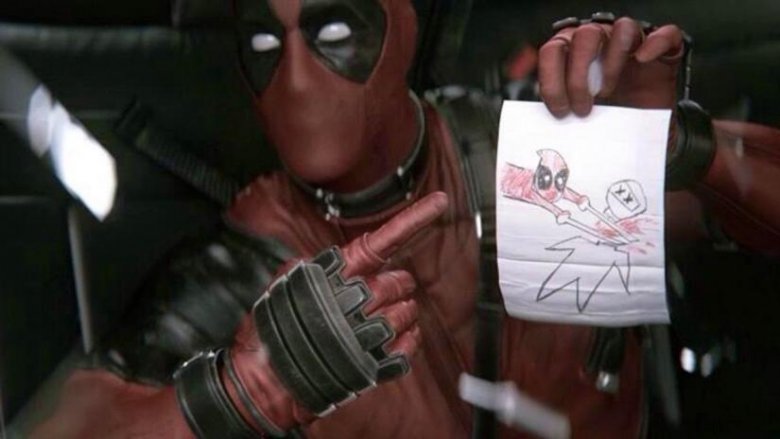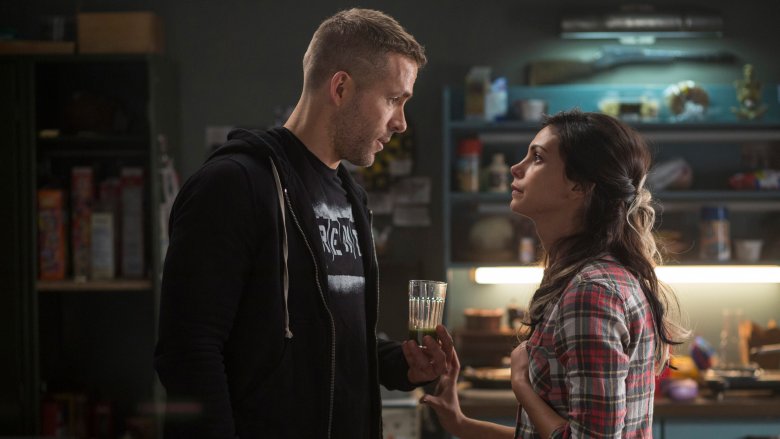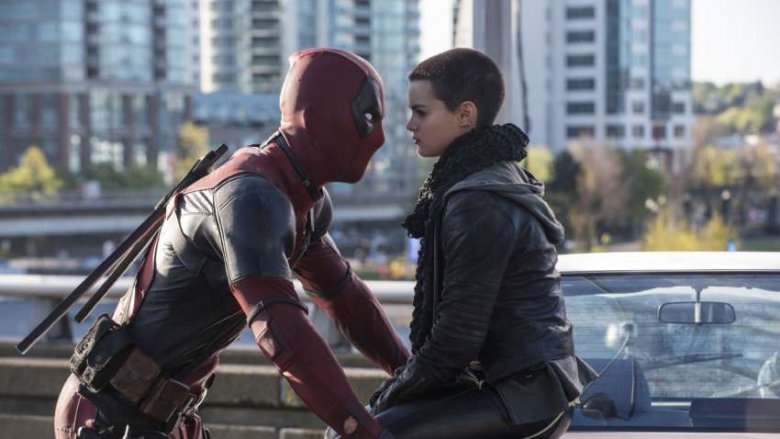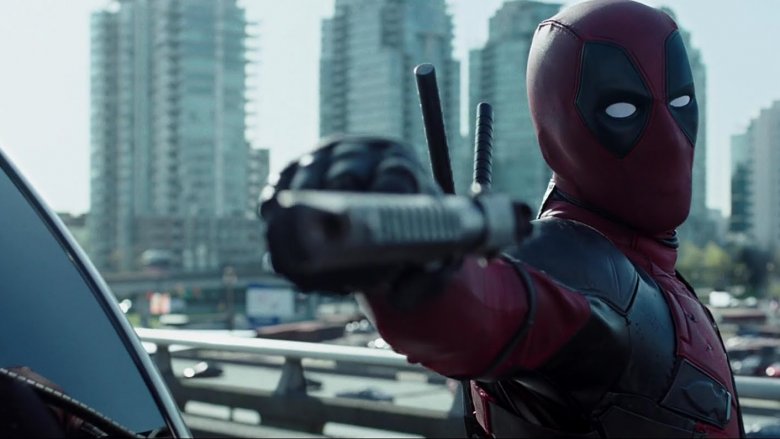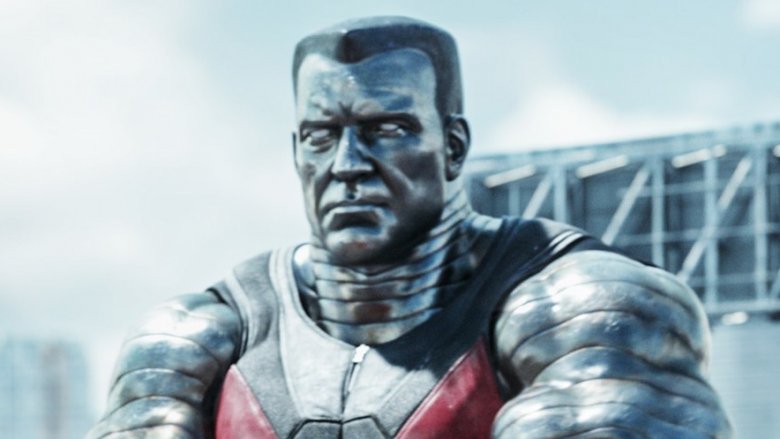How Deadpool Changed Movies And You Barely Noticed
Deadpool made quite a splash at the movies when it debuted in 2016. It brought all the essentials of a good superhero flick: meta humor, B-list characters, minimalist action... okay, well, maybe its ingredients weren't the most orthodox when it comes to what we'd expect from a movie starring a Marvel character. But ordinary or otherwise, this strange approach to superhero cinema definitely worked.
One major reason for Deadpool's success was its R rating, which ensured bad words and copious amounts of violence would be on offer, but that's easy to spot. We're here to discuss the more esoteric reasons behind Deadpool's victory over low expectations — and, ultimately, superhero cinema as a whole. After all, this movie didn't just shake up the status quo for action adventures starring guys in capes — it went the extra mile and set a lot of cinematic precedents, some of them quite subtly. Read on to see how Deadpool surreptitiously changed movies and you barely noticed.
A new kind of marketing
Deadpool's marketing is basically a movie's worth of entertainment in and of itself. Seriously, from Mother's Day gags to billboards that shouldn't exist, the folks behind Deadpool pulled out all the stops to make sure hype would be at its absolute peak by the time the superhero hit the big screen.
What made it so special isn't just its excessive, over-the-top humor, but also its not-so-subtle meta slant. Befitting the character, Deadpool's marketing made sure to tap into fourth-wall-breaking territory, showcasing a degree of self-awareness that elated the meme generation. This marketing knew its target demographic so well that it transcended its own status, resulting in Deadpool's pre-release antics being shared as entertainment rather than advertising. This led to an unprecedented degree of organic word of mouth, which likely played a huge part in Deadpool's debut as the one of the biggest R-rated openings of all time.
It's not like it didn't deserve that awesome achievement. After elaborate ads like an SNL-esque Halloween skit, a Valentine's Day rom-com fakeout campaign and many, many more quirky bits of publicity, Deadpool set a new bar for inventive marketing in cinema.
B-list is the new A-list
So what if Justice League has A-listers like Superman, Batman, and Wonder Woman? No one cares about them or that movie; B-listers are the new hot property. After all, Deadpool was only as good as its red-suited mutant and his ensemble of backup dancers, which included beloved comic book characters like Weasel... and Negasonic Teenage Warhead... okay, neither of these were fan favorites. And while Colossus definitely had (and has) a following, it'd be a serious stretch to call him an A-lister. Really, the cast of this movie, from top to bottom, was as B-list or below as it got — and that's probably why it worked so well. Virtually none of these characters had to worry about living up to overwhelming audience expectations, meaning there was minimal pressure and maximum freedom to adapt them however would best suit the film. And that's exactly what Deadpool did, writing them smartly and entertainingly enough to fit within the film's universe while simultaneously maintaining their core comic book identities. For those reasons, the movie nailed building its own team of budget Avengers, effectively proving to Hollywood that you don't need an Iron Man or Wonder Woman to produce a moneymaker loaded with franchise-starting characters.
Penny pinching
Deadpool was created on a paltry budget of $58 million. While that's a lot of money, it's not a lot compared to what the genre usually demands for its blockbusters. Just look at the first Avengers budget: $220 million. And even if we only look at other solo superhero adventures starring Ryan Reynolds, that still brings us up to production budgets in the $200 million range. The point is, these movies are expensive to make — or were, until Deadpool proved it's possible to do so much more with so much less.
On its shoestring budget, Deadpool relegated itself to only one fully CG character (Colossus), no more than a few action sequences, and even a finale scene that omitted guns entirely solely to keep the budget tight. These sacrifices forced Deadpool to stay focused on the things money can't buy: genuine character development and good humor. With these two tools in its arsenal, Deadpool managed to make every action scene twice as intense and every CGI interaction that much more powerful.
The power of fan hype
If there's one movie that shines as a prime example of what fans can accomplish when they band together to create buzz on the internet, it's Deadpool. If not for the leaked test footage, we might very well have never gotten a Deadpool solo movie at all. But Fox felt compelled to dish out $58 million as a result of a lot of geeks on the internet screaming about how much they wanted some goofball in a red jumpsuit to shoot people and say bad words. What a time we live in.
Though we've yet to see another brave test footage leaker come out of the woodwork to make their hypothetical dream movie a studio-budgeted reality, it doesn't change the fact that the Deadpool situation and the response by Fox set a new precedent in the filmmaking world: when the internet speaks, it can make real change. In the old days, Hollywood was a gated kingdom where the true power brokers all wore suits and traded business cards. Moving forward, we now know another party has a voice at the decision-making table: the fans. It's just a matter of making enough noise.
Walking the line between self-aware and sincere
A lot of films fall into the trap of being overly sincere — or, in more recent years, too self-aware. Movies like Batman v Superman: Dawn of Justice showed us what can happen when a movie takes itself far too seriously, and on the other end of the spectrum, if every other minute of a film is littered with self-referential dialogue that spells out "yes, this is a movie about stupid stuff that we all know is stupid," then there's no room whatsoever for real emotional investment by the audience.
Deadpool, the first and best of its meta-kind, showed that it's possible to be extremely self-aware but also legitimately emotional at the same time. Deadpool tied most of its fourth-wall-breaking antics to the main character's superhero alter ego, so that whenever Wade Wilson and Vanessa Carlysle were sharing an intimate, real beat, no "you're watching a silly superhero movie" humor would crop up and ruin the moment. It was a smart balancing move that ensured audiences would care about Wade and Vanessa's happiness and wellbeing, while also being able to laugh at all of Deadpool's zany shenanigans.
Pushing sexual barriers in cinema
Leave it to a movie about foul-mouthed superheroes in spandex to normalize healthy sexual experimentation between men and women. While most went into Deadpool expecting a pretty standard Hollywood romance between Wade Wilson and Vanessa Carlysle, what they got was anything but. Culinary play during sex? It's in there. Pegging? Yep, that's there too. This remains the most sexually revolutionary film to hit the mainstream in some time, encouraging couples to try things and ignore prudish taboos. It challenged assumptions regarding what's masculine, what's healthy, and what's sexually kosher. It played by its own rules, and in the process, it encouraged us to do the same. In this sense, Deadpool definitely changed the rules for mainstream cinema, and we can hope the trend-bucking trend continues across all genres. Since sex-centric films like Nymphomaniac and Fifty Shades of Grey routinely fail to capture the good side of the general public's attention, hopefully Deadpool's more positive approach to sex can be used as a barometer for the boundaries waiting to be pushed with the masses.
The importance of being subtle
Disaster awaits when a movie tries too hard to be edgy and wacky and never reels itself in enough to have impact. Deadpool, however, nailed this high wire act and managed to keep its humor, action, and emotion in check so nothing took viewers out of the moment. No jokes were overemphasized to the point where they ruined a scene, no action scenes were too ridiculous for their own good, and no emotional beats were hammed up to the point where audiences rolled their eyes. Deadpool kept its jokes subtle and rapid, so that if you didn't chuckle at one you'd be laughing at another within a matter of seconds. It kept its action brisk so there was never a sense of "is this really necessary?" — and it kept its romance between Wade and Vanessa as real and understated as possible. Every interaction between the main couple was reserved and relatable. In short, Deadpool proved that subtlety doesn't just work — it can make a superhero movie.
Superhero movies can be comedies now
Prior to Deadpool, few thought that a movie loaded with CGI gunfights, throwdowns and explosions could ever operate as a functional comedy. Guardians of the Galaxy was as close as any superhero film had come to achieving that, and even that movie veered more into action-adventure territory. Deadpool went for the guffaws right from its opening title sequence all the way 'til the very end of its credits. For the crowds who like raunchy Seth Rogen comedies and Seth MacFarlane's comedic fare, this movie fit the bill and felt more like a Marvel-flavored big-budget parody than an actual superhero movie.
This movie's effects on the industry are readily apparent. It might've come out later that same year, but given the extensive reshoots Suicide Squad went through, one can venture a guess that the movie's sudden influx of meta-humor might've been the result of Deadpool's success. The jury's still out on 2019's Shazam! movie, but judging from the trailer, it sure looks like it's poised to follow in the Merc with a Mouth's comedy-centric footsteps.
The superhero movie for people who hate superhero movies
Between making fun of its own genre and basically co-opting another by being a weird hybrid comedy, Deadpool birthed a whole new breed of film: the superhero movie for people who hate superhero movies. The audience can get a kick out of Deadpool's mockery of superhero antics while also enjoying some of his less ironic, more straightforward humor. Plus, given that Deadpool doesn't have any visually over-the-top superpowers, no anti-superhero moviegoers had to put up with seeing metal claws come out of Wade's knuckles or watch him wave around a Green Lantern ring. It was a movie with swords, guns, and other generic armaments one might see in any other action movie. If you stack that on top of the movie's sense of humor, it becomes clear how someone who's a fan of something like Pineapple Express but hates Man of Steel could stumble into a screening of Deadpool and still be happy. He's the superhero for the normies and casuals, those who don't want to feel superheroic but want to be part of the cultural zeitgeist. The irony, of course, is that by coloring outside the genre lines, Deadpool has further expanded the comic book superhero movie's already massive market share.
